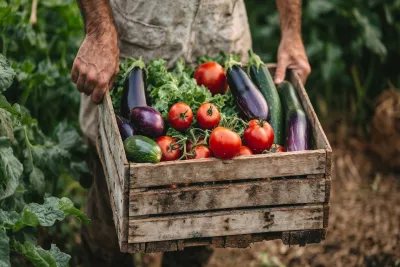General information
RDP Measure
- M20: Technical assistance
Beneficiary type
- Producer group / cooperative / farmer’s association
Summary
A communication campaign promoting organic farming was supported by Portugal’s National Rural Network, emphasising the advantages of organic agriculture and improving community appreciation of sustainable farming practices.
It focused on organic systems’ reliance on natural processes and avoidance of artificial or energy-intensive inputs. Targeted communication efforts advocated such organic practices and principles, highlighting how organic methods align with broader self-sufficiency and development goals for farming communities.
Storytelling in communication campaigns portrayed organic agriculture as a modern, science-based practice. This helped the campaign appeal to younger farmers and entrepreneurs. Such agroecology narrative positions organic farming not as a return to the past but as an evolution that harnesses scientific research to enhance productivity while preserving ecological integrity.
Farmers, technicians, consumers and rural residents were the target audience. A comprehensive content plan for the campaign explained topics, including cooperation in producer groups, family farming links, agri-chemical safeguards, legal and certification rules.
Results
- 34 awareness-raising actions took place from the north to the south of the country
- Outcomes enhanced both the present and future landscape of this sector. Emphasising supportive legislation, the campaign highlighted existing policies that foster organic production.
- The visibility of organics was enhanced to bolster market growth by creating better access to information about certified products.
- Understanding improved about enabling factors for multi-product producer group management.
- Overall, the project demonstrated Portugal's commitment to fostering a robust organic farming sector.

Promoter
AGROBIO – Associação Portuguesa de Agricultura Biológica
Funding
RDP support: 37 199 (EUR)
Ressources
Liens
Context
EU funds help shape agricultural practices across Europe, and the CAP can support awareness-raising campaigns aimed at improving knowledge among rural residents and businesses of the benefits of organic farming. This practice helps expand organic land coverage and promotes sustainable food production while strengthening understanding of local agricultural ecosystems. By emphasising the advantages of organic farming (such as seasonal products grown from local varieties that are more resilient to water stress), these campaigns can enhance community engagement and support for sustainable agricultural practices.
Organic farming can be characterised by its reliance on natural processes and the avoidance of artificial or energy-intensive inputs. Targeted communication efforts can advocate such organic practices and principles, highlighting how organic methods align with broader self-sufficiency and development goals for farming communities.
Sustainable food production generated through organic farming not only reduces dependency on external inputs in rural areas but also promotes biodiversity and soil health. Consequently, raising awareness about these benefits encourages farmers to adopt more sustainable practices while simultaneously appealing to consumers who increasingly seek environmentally friendly options.
Storytelling in communication campaigns can emphasise organic agriculture as a modern, science-based practice. This helps campaigns appeal to younger farmers and entrepreneurs, and such narratives position organic farming not as a return to the past but as an evolution that harnesses scientific research to enhance productivity, while preserving ecological integrity.
In Portugal, support from the CAP’s National Rural Network TA budget was used with good effect by an organic farming association in rural communication campaigns.
Objectives
Ultimately, this project’s aim was to increase coverage of organic farmland in Europe. It would achieve this by:
- publicising Portuguese organic food systems covering production, processing, and marketing, particularly in rural areas.
- raising awareness among producers about organising and promoting organic production in short supply chains, without neglecting market opportunities from the sale of surplus organic production to areas with high demand, such as Porto, Lisbon, and other larger population centres.
- increasing appreciation of the importance and benefits of an agro-energy transition with renewable energy (especially in irrigation), and reducing the ecological footprint of food by consuming fewer fossil fuels.
The Organic Farming campaign sessions were planned with the aim of having direct contact with local people to understand the reality experienced in rural areas and how organic farming can serve as a method of enhancing regions.
Activities
34 awareness-raising actions were arranged, expanding the original plan of 28 events so as to extend national coverage of the rural networking project’s activities. The following communication campaign Programme of Awareness Raising Activities took place:
I - Organic Farming in Portugal - Present and Future
- Legislation
- Areas in Organic Production
- Number of organic operators
- Organic Vegetable Producers
- Organic Animal Producers
- Certified Training
- Database of Organic Plant Material
- Authorised Fertilising Materials
- Phytopharmaceuticals Authorised in Organic Farming
- Prospects for Organic Farming
- Proposals
II - Organisation of Production - Multi-Product Producer Groups
- Legal forms
- Legal control
- Activities and objectives
- Types
- Family farming
- In organic production
- Certified products (PDO and PGI)
- Other sustainable production, in vulnerable territories
- General requirements
- Specific requirements
III - AGROBIO - Portuguese Organic Farming Association
- Organic Farming in Portugal - Present and Future
- Production Organisation - (Multiproduct Groupings)
- European Day of Organic Farming - 23 September 2022
- 1st Part - Ourém Municipal Theatre
- 2nd Part - Quinta do Montalto - Ourém
- The European Day of Organic Farming and Production 2022 (YouTube. com)4
The target audience for project actions was 600 participants, mainly including farmers, technicians, consumers and the public.
Main results
- Initially, 28 awareness-raising campaigns were planned throughout the country. However, halfway through the project, it was decided to carry out 34 awareness-raising actions, from the north to the south of the country, to have a wider territorial coverage.
- The proposed objectives were therefore achieved, promoting organic production and short supply-chain marketing circuits through direct and local sales.
- The communication campaign on organic farming in Portugal resulted in outcomes enhancing both the present and future landscape of this sector. Emphasising supportive legislation, the campaign highlighted existing policies that foster organic production.
- Project work underscored the thriving community of organic crop and livestock farms. It highlighted how training equipped these farmers with the necessary skills vital in ensuring quality standards are met across all producers.
- Knowledge was networked about the database for organic plant materials, authorised agri-chemicals, pest management, and aligning practices with environmental sustainability goals.
- The visibility of organics was enhanced to bolster market growth by creating better access to information about certified products.
- The understanding of enabling factors for multi-product producer group management improved.
- Overall, the project demonstrated Portugal's commitment to fostering a robust organic farming sector.
Key lessons
- Storytelling in communication campaigns like this serves as an effective vehicle for illustrating organic production benefits and synergies, making complex scientific concepts accessible while celebrating local traditions. Ultimately, this integrative approach can enhance the credibility of organic agriculture initiatives in rural contexts.
- Incorporating elements of traditional farming practices into these communication campaign narratives fosters a sense of cultural heritage and community identity. Rural populations often have deep-rooted connections to their agricultural history. Hence, stories emphasising the continuity between past methods and modern techniques can engender trust and acceptance.
- National Networks coordinate effective awareness-raising communication campaigns for European rural residents and businesses in farming communities about the benefits of organic farming as a production method that generates sustainable food better from products grown seasonally with local varieties that are more resistant to water stress and without the use of energy-intensive conservation methods such as refrigeration.
Pedro Frias
Jaime Manuel Carvalho Ferreira

